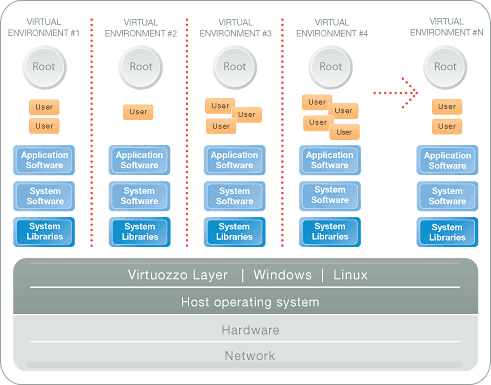A virtual private server (VPS) is a method of partitioning a physical server computer into multiple servers. Each virtual server looks and behaves exactly like a real networked server system, can run its own full-fledged operating system, and each server can be independently rebooted.
The practice of partitioning a single server so that it appears as multiple servers has long been common practice in mainframe computers, but has seen a resurgence lately with the development of virtualization software and technologies for other architectures.
OpenVZ
OpenVZ is an Operating System-level server virtualization solution, built on Linux. OpenVZ creates isolated, secure virtual environments — containers (otherwise known as virtual private servers, or VPSs) on a single physical server enabling better server utilization and ensuring that applications do not conflict. Each container performs and executes exactly like a stand-alone server; containers can be rebooted independently and have their own root access, users, IP addresses, memory, processes, files, applications, system libraries and configuration files.
We use OpenVZ, the Open Source variant of Virtuozzo. As you can see, each VPS is isolated from the other containers. Each VPS can have different applications, comes with a unique root user, who is in full control over the server. This used to be possible on Dedicated Servers only at a much higher cost.
Further on, each VPS can be a different Linux based Operating System. A VPS can be provisioned within a few minutes once an order has passed the fraud tests.
OpenVZ allows us to set resource limits to avoid situations where one customer’s VPS takes over all resources of a server. There are over two dozen resources that can be adjusted for each VPS.

